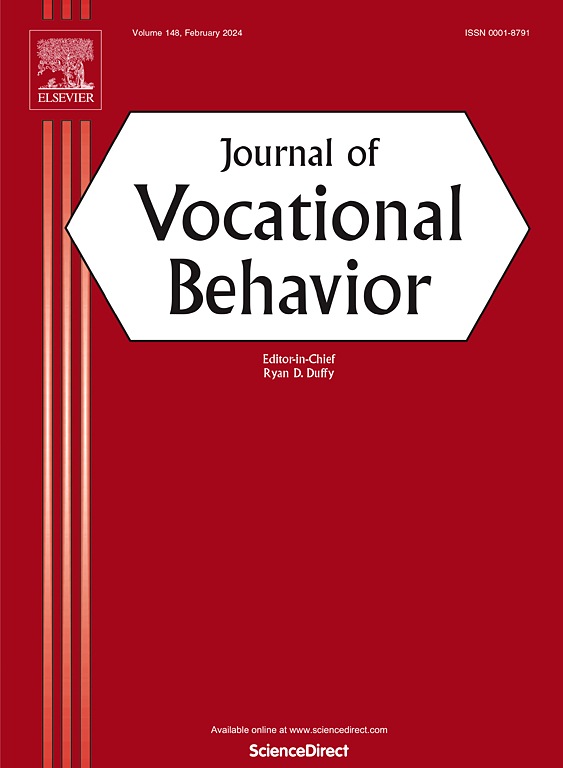Female leaders' journey after childbirth: Exploring the longitudinal relationship between work-family conflict and affective commitment using a mixed-method approach
IF 5.2
1区 心理学
Q1 PSYCHOLOGY, APPLIED
引用次数: 0
Abstract
This study examines the trajectory of work-family conflict among female leaders after childbirth and the relationship between work-family conflict and affective commitment. Guided by boundary theory and the work-home resources model, we explored how increases in work-family conflict encountered by female leaders relate to decreases in their affective commitment, depending on an organization's work-priority climate. In our quantitative study, we used a latent growth model based on data from three waves of the Korean Women Manager Panel with 410 female leaders with young children. Results showed that the initial level of work-family conflict was negatively related to the initial level of affective commitment. Additionally, increases in work-family conflict were related to decreases in affective commitment. This relationship was more pronounced in organizations with a strong work priority climate than in those with a weak one. Our qualitative study of interviews with 21 female leaders with young children further revealed that work-family conflict undermines affective commitment through heightened resource depletion, reduced relational attachment, diminished organizational trustworthiness, and shifted work-life ideologies, particularly in organizations with strong work-priority climates. Our work deepens our understanding of work-family conflict among female leaders and has theoretical and practical implications for navigating leadership and parenting roles.
女性领导产后之旅:运用混合方法探讨工作-家庭冲突与情感承诺的纵向关系
本研究旨在探讨女性领导产后工作家庭冲突的发展轨迹,以及工作家庭冲突与情感承诺的关系。在边界理论和工作-家庭资源模型的指导下,我们探讨了女性领导者遇到的工作-家庭冲突的增加与她们情感承诺的减少之间的关系,这取决于组织的工作优先气候。在我们的定量研究中,我们使用了基于韩国女性经理小组三波数据的潜在增长模型,该小组有410名有年幼子女的女性领导者。结果表明,工作家庭冲突的初始水平与情感承诺的初始水平呈负相关。此外,工作家庭冲突的增加与情感承诺的减少有关。这种关系在工作优先度高的组织中比在工作优先度低的组织中更为明显。我们对21位有年幼子女的女性领导者的访谈进行了定性研究,进一步揭示了工作-家庭冲突通过加剧资源消耗、减少关系依恋、降低组织可信度和改变工作-生活意识形态来破坏情感承诺,尤其是在工作优先氛围强烈的组织中。我们的研究加深了我们对女性领导者中工作-家庭冲突的理解,并对引导领导和育儿角色具有理论和实践意义。
本文章由计算机程序翻译,如有差异,请以英文原文为准。
求助全文
约1分钟内获得全文
求助全文
来源期刊

Journal of Vocational Behavior
PSYCHOLOGY, APPLIED-
CiteScore
13.10
自引率
5.40%
发文量
85
期刊介绍:
The Journal of Vocational Behavior publishes original empirical and theoretical articles offering unique insights into the realms of career choice, career development, and work adjustment across the lifespan. These contributions are not only valuable for academic exploration but also find applications in counseling and career development programs across diverse sectors such as colleges, universities, business, industry, government, and the military.
The primary focus of the journal centers on individual decision-making regarding work and careers, prioritizing investigations into personal career choices rather than organizational or employer-level variables. Example topics encompass a broad range, from initial career choices (e.g., choice of major, initial work or organization selection, organizational attraction) to the development of a career, work transitions, work-family management, and attitudes within the workplace (such as work commitment, multiple role management, and turnover).
 求助内容:
求助内容: 应助结果提醒方式:
应助结果提醒方式:


